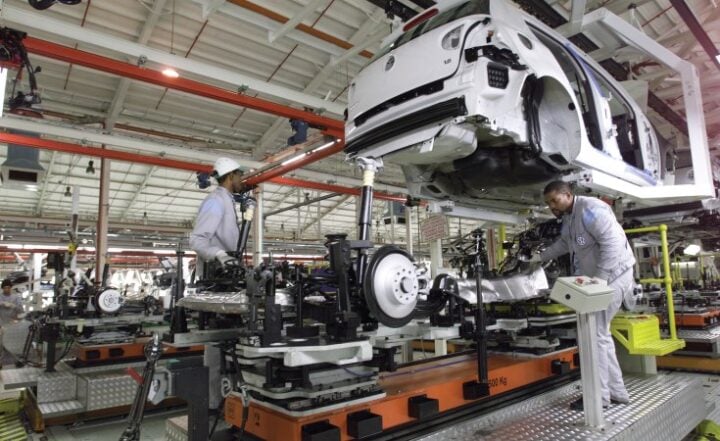The Manufacturers Association of Nigeria (MAN) says the outlook for the production sector in 2024 may not be a positive one, especially in the first half (H1) of the year.
In its ‘Manufacturing Sector Outlook for 2024’ seen by TheCable on Wednesday, MAN said the period will be challenging, with a subtle possibility of recovery from the third quarter.
To revive the sector, MAN said the deployment of policies supported by “domestic growth-driven, export-focused and offensive trade strategies”, will promote resilience and ensure that the sector gains meaningful traction in the later part of the year.
The association expressed hope that the government will see the manufacturing sector as the key driver of sustained economic growth and will give it the priority that it deserves.
Advertisement
Highlighting the projections for the sector in 2024, the association said there will be clarity around deepening industrialisation.
“Average capacity utilization will still hover around the 50 percent threshold as the forex-related challenges and high inflation rate limiting manufacturing performance may linger until mid-year,” MAN said.
“The sector may experience a meagre improvement in manufacturing output as forex and interest rates-related challenges are expected to subside from the third quarter.
Advertisement
“Higher manufacturing output is envisaged from the beginning of the third quarter of the year as the government disburses capital provisions of the budget to abandoned, ongoing and new capital projects with expected special preference for locally made products.
“The results of the emerging upward surge in global oil prices, domestic oil and gas production, local refining of petroleum products and projected gains of exchange rate unification will promote stability in the forex market and impact manufacturing positively from the second half of the year.
“This will lead to a reduction in the pressure on demand for forex and improve the inflow of export proceeds from oil and gas.
MAN added that the ongoing tax reforms and the envisaged bank recapitalisation will frontally address the challenges of multiple taxation and poor access to credit that have continued to limit the manufacturing sector’s performance if successfully implemented.
Advertisement
According to the outlook, the implementation of the Electricity Act of 2023 will increase private investment in renewable energy, enhance energy efficiency and improve electricity supply to the production sector.
‘PRIORITISE FX ALLOCATION, REDUCE NUMBER OF BDCs‘
Proffering recommendations for improving the sector, MAN urged the government to adopt several measures to amplify the projected upswing in the year 2024.
The year 2024, the association argued, may start on a tough note for manufacturing but may end with some measured improvements because the “envisaged policy reforms, improved commitment to domestic production and general positive outlook seems favourable for the sector”.
Advertisement
The group asked the government to “expend cost saving from fuel subsidy to deploy a bouquet of production-focused policies”, backed with more structural measures to combat the peculiar inflationary pressures from insecurity, energy, and transport costs.
“Government should lead by example and give priority to patronage of made-in-Nigeria products in all its purchases and for all government contracts and projects,” MAN said.
Advertisement
“Government should encourage local sourcing of raw materials through comprehensive and integrated incentives to address the challenges of low productivity and imported inflation.
“Utilise the 2024 budget to sustain efforts at improving infrastructural developments, especially in strategic industrial hubs to reduce operation and logistics costs and promote competitiveness.
Advertisement
“Maintain all measures to boost the level of liquidity and degree of transparency in the official forex window even as the backlog of $7 billion forex obligations is being cleared.
“Manage the floating exchange rate system within an acceptable lower and upper bound, pending the actualization of a net-exporting economy aspirations.
Advertisement
“Prioritise forex and credit allocation to the manufacturers and reduce the number of BDCs into large and well-established operators to curb their excesses and untoward operations through effective management and supervision.
“Encourage inflow of foreign direct investment into pre-determined and domestic production-enhancing businesses. Should intentionally guide diaspora remittances into non-oil sectors, especially manufacturing to aid forex inflows and curb rising inflation.
“The apex bank should allow forex access for the importation of vital industrial inputs that are currently not available locally and subject them to backward integration policy that gives priority to a predictable sunset clause.”
MAN also said the CBN should develop a sustainable framework to channel credit interventions into the manufacturing sector, outside the direct intervention.
The manufacturing body said the apex bank should direct commercial banks to intentionally provide long-term single-digit interest loans to members to fast-track the actualisation of a $1 trillion economy.
The association, therefore, offered to be part of a monitoring and evaluation team to “ensure that the government gets value for incentives offered to achieve this objective”.
Add a comment






